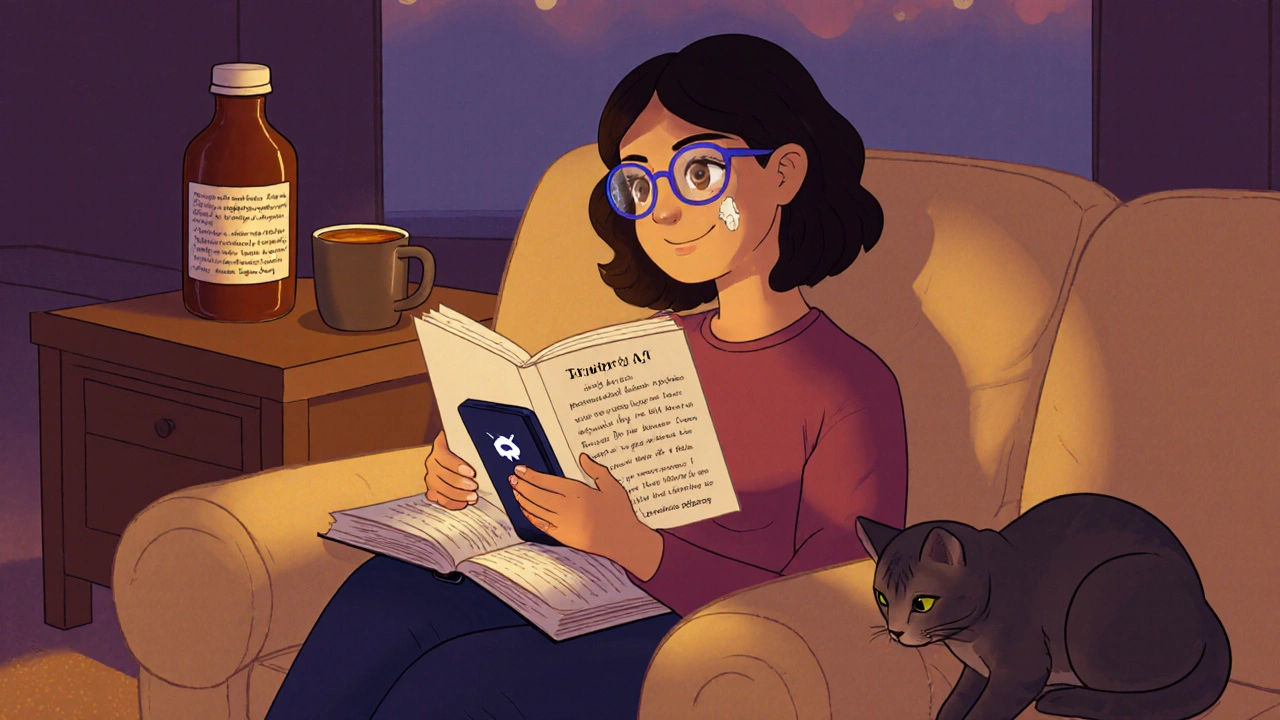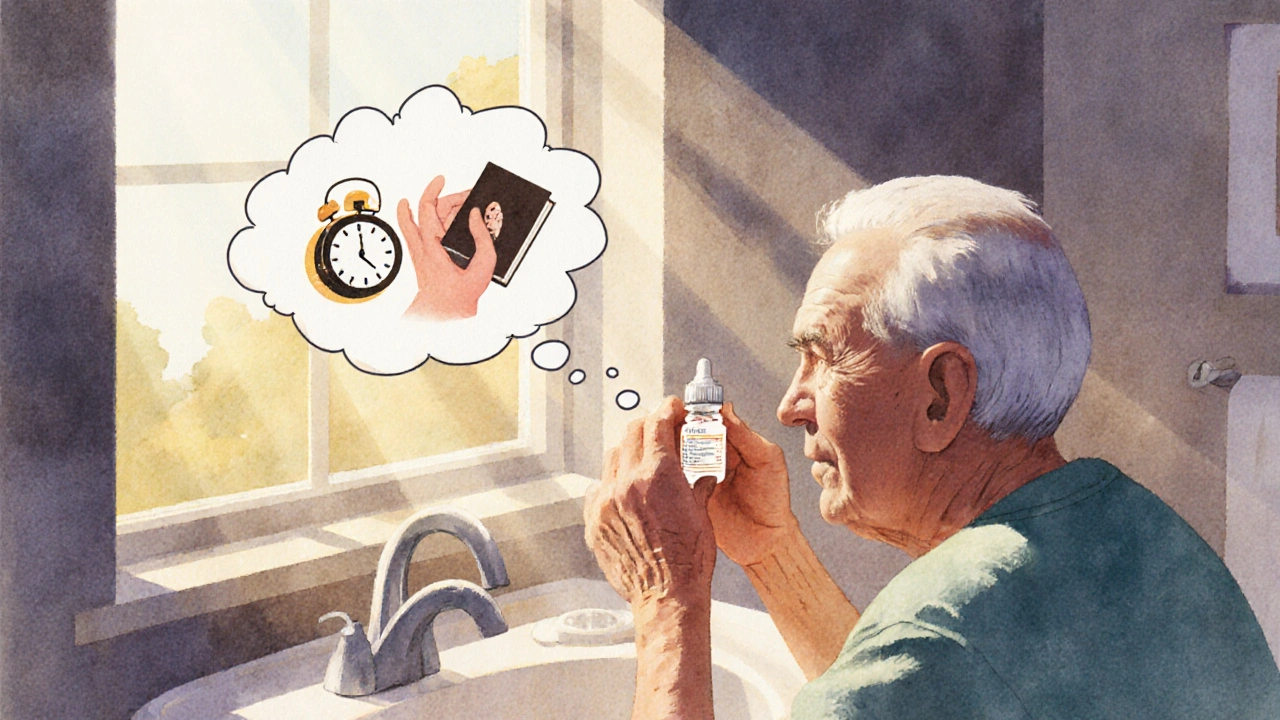Getting diagnosed with glaucoma changes everything. It’s not just about blurry vision or needing eye drops every day. It’s about fearing you’ll lose your sight-slowly, quietly, and without warning. For many, the real battle isn’t just lowering eye pressure. It’s the anxiety, the sleepless nights, the feeling that your future is slipping away. And if you’re taking travoprost, you’re not just managing a medical condition. You’re managing fear.
What Travoprost Actually Does
Travoprost is a prostaglandin analog, a type of eye drop prescribed to lower intraocular pressure in people with open-angle glaucoma or ocular hypertension. It works by increasing the outflow of fluid from the eye, reducing the pressure that damages the optic nerve. It’s not a cure. It doesn’t restore vision. But it does slow down the progression-often dramatically.
Studies show travoprost can reduce eye pressure by 25% to 33% when used daily. That’s the difference between losing peripheral vision in five years versus fifteen. But here’s the catch: you have to use it every single day, without fail. Miss a dose? Pressure creeps back up. That’s where the mental toll starts.
The Hidden Cost of Daily Eye Drops
Imagine waking up every morning and putting a drop in each eye. Then again before bed. Do it for months. Then years. Now add in the cost-travoprost isn’t cheap. Add in the sting, the blurred vision for five minutes after each drop, the fear of accidentally touching your eye with the bottle. Add in the guilt when you forget.
One 2023 study of over 800 glaucoma patients found that nearly 60% reported moderate to severe anxiety about their vision loss. More than half said they felt like a burden to their families. One woman in the study, 68, told researchers: “I cry every time I put in my drops. Not because it hurts. Because I’m reminded I’m losing something I can’t get back.”
Travoprost is a tool. But the ritual around it becomes a daily reminder of vulnerability. That’s not just stress. That’s chronic emotional strain.
How Glaucoma Stress Shows Up
Stress from glaucoma doesn’t always look like crying. Sometimes it looks like avoiding driving at night. Or refusing to go to movies because you’re afraid you’ll miss something. Or canceling plans because you’re too tired from worrying.
Common signs include:
- Constantly checking your vision-“Can I still see the clock?” “Did I miss a word on the page?”
- Anger over small things-a dropped cup, a missed bus-because your brain is screaming, “What if this is the start of something worse?”
- Sleep problems. You lie awake wondering if you remembered your drops. Or if the pressure spiked overnight.
- Isolation. You stop joining group activities because you’re afraid people will notice you’re not seeing well.
- Feeling guilty for being “negative” when you’re just scared.
This isn’t weakness. It’s a normal response to a life-altering diagnosis. Your body isn’t just fighting high pressure. It’s fighting the fear of losing independence.

Travoprost Isn’t the Enemy-The Silence Is
Doctors talk about pressure numbers. They don’t always ask how you’re sleeping. Or if you’ve stopped reading books. Or if you’re afraid to be alone.
That silence makes it worse. Many patients feel like they’re being dramatic when they bring up anxiety. But mental health and glaucoma are deeply linked. Research from the American Academy of Ophthalmology shows that people with glaucoma are twice as likely to develop depression as those without it. The risk goes up with the severity of vision loss-and with how long you’ve been on treatment.
Travoprost keeps your pressure down. But if you’re drowning in stress, the medication alone won’t save your quality of life.
What Actually Helps: Real Strategies, Not Just Advice
You don’t need another “stay positive” speech. You need tools that work in real life.
1. Build a Drop Routine That Doesn’t Feel Like Punishment
Put your travoprost next to your toothbrush. Use the same time every day-morning after brushing, night after washing your face. Tie it to something you already do. Make it automatic.
Set a phone reminder with a gentle tone-not a blaring alarm. Label the bottle: “My sight is worth this.”
2. Talk to Someone Who Gets It
Join a glaucoma support group. Not just online. In person. There are groups in Halifax, Toronto, and Vancouver that meet monthly. People there know what it’s like to stare at a bottle and wonder if it’s enough. You don’t have to explain. You just sit there. And you breathe.
One man in Halifax, 72, said: “I went to my first meeting thinking I was the only one who cried over drops. Turns out, half the room did. We didn’t fix anything. But we stopped feeling alone.”
3. Use Vision Aids Without Shame
Smartphone magnifiers, high-contrast reading apps, voice assistants-they’re not signs of defeat. They’re upgrades. Try apps like Seeing AI or Envision AI. They read text aloud, describe rooms, recognize faces. Many are free. Use them. Your brain will thank you.
4. Move Your Body-Even a Little
Walking 20 minutes a day lowers eye pressure. It also lowers cortisol, the stress hormone. You don’t need to run a marathon. Just walk. Outside. Watch the trees. Notice the light. Let your mind rest for a few minutes without thinking about pressure numbers.
5. Ask Your Doctor About Mental Health
Ask: “Can you refer me to someone who works with chronic illness patients?” Many ophthalmology clinics now have counselors on staff. If not, ask your family doctor. Antidepressants like SSRIs can help-not because you’re “depressed,” but because chronic stress rewires your brain. Treatment isn’t weakness. It’s maintenance.

When Travoprost Isn’t Enough
Some people need more than drops. Laser treatments, minimally invasive glaucoma surgery (MIGS), or even traditional surgery might be options. But even when pressure is under control, the fear doesn’t vanish overnight.
That’s okay. Healing isn’t linear. Some days, the drops feel like armor. Other days, they feel like a cage. Both are valid.
What matters is that you’re still here. Still trying. Still putting in the drops. That’s courage.
It’s Not Just About Sight
Glaucoma doesn’t just steal vision. It steals the illusion of control. Travoprost gives you back some of that control-but only if you let yourself feel the weight of what you’re carrying.
You’re not just a patient. You’re someone learning to live with uncertainty. And that’s one of the hardest things a person can do.
But you’re not doing it alone. Thousands of people are right beside you-with the same bottle, the same fears, the same quiet determination.
Keep putting in the drops. And don’t forget to put in the care-for yourself, too.
Can travoprost cause depression or anxiety?
Travoprost itself doesn’t directly cause depression or anxiety. But the daily reality of managing glaucoma-constant worry about vision loss, the burden of lifelong treatment, and the isolation that often follows-can lead to these conditions. Studies show glaucoma patients have a higher risk of depression, regardless of the medication used. The stress comes from the diagnosis and its impact on daily life, not the drug.
What should I do if I keep forgetting my travoprost drops?
Use a pill organizer with a timer, or set two phone alarms-one for morning and one for night. Link the drops to a daily habit like brushing your teeth or making coffee. Some people use apps like Medisafe or MyTherapy that send reminders and track doses. If you miss a dose, don’t double up. Just take the next one as scheduled. Consistency over perfection matters more than flawless adherence.
Are there alternatives to travoprost for glaucoma?
Yes. Other first-line options include latanoprost, bimatoprost, and timolol. Each works differently and has different side effects. Latanoprost is similar to travoprost but may cause less eye redness. Timolol is a beta-blocker and may not be safe for people with asthma or heart conditions. Your doctor will choose based on your eye pressure, medical history, and how well you tolerate side effects. Some patients switch medications to find the best fit for their lifestyle and comfort.
Can stress make glaucoma worse?
Chronic stress doesn’t directly cause glaucoma to progress, but it can raise eye pressure temporarily. More importantly, stress makes it harder to stick with your treatment plan. If you’re overwhelmed, you’re more likely to skip drops, skip appointments, or avoid checking your vision. Managing stress helps you stay consistent-which is the real key to slowing glaucoma.
Is it normal to feel guilty about needing help with glaucoma?
Yes, it’s very common. Many people feel guilty asking for help because they think they should be able to handle it on their own. But glaucoma is a chronic condition that affects daily tasks like reading, driving, and recognizing faces. Needing support-whether it’s from family, apps, or a counselor-isn’t a failure. It’s smart. It’s how people adapt and keep living well.
Next Steps: What to Do Today
- Check your travoprost bottle. Is it labeled clearly? Set a reminder right now for tomorrow’s drop.
- Search for a local glaucoma support group in your city. Even one meeting can change how you feel.
- Download one vision aid app-Seeing AI or Envision AI-and try it on your next meal or book.
- Ask your doctor: “Can we talk about how this diagnosis is affecting my mental health?”
- Write down one thing you still enjoy doing despite glaucoma. Hold onto that.
You’re not just managing pressure. You’re rebuilding your life around a new reality. And that takes time, patience, and more courage than most people realize.

George Clark-Roden
November 2, 2025 AT 09:55It’s not just the drops-it’s the silence that follows. The way your reflection in the bathroom mirror seems to stare back like a stranger who’s been slowly erased. I’ve been on travoprost for seven years. Some days, I put the bottle down and just sit. No tears. No panic. Just... presence. And that’s enough. You don’t need to fix it. You just need to be there. With the bottle. With the fear. With yourself.
Jonathan Debo
November 4, 2025 AT 06:47Let’s be precise: travoprost is a prostaglandin F2α analog, which modulates the uveoscleral outflow pathway via FP receptor agonism-this is not ‘increasing fluid outflow’ as the post vaguely states. And while the psychological burden is real, the article dangerously conflates correlation with causation: glaucoma-related depression is not caused by the drug, but by the existential dread of progressive vision loss. Also, ‘Seeing AI’? That’s Microsoft’s product. Not ‘apps like’. Capitalization matters.
Hope NewYork
November 5, 2025 AT 22:18I used to cry over my drops too. Not because they stung. But because I’d look at the bottle and think: ‘This is the last thing I’ll ever do for myself that matters.’ Then one morning, I held it in my palm and whispered, ‘You’re still here.’ And I was. Still here. Still breathing. Still seeing-just differently. That’s not weakness. That’s the quietest kind of heroism.
Bonnie Sanders Bartlett
November 6, 2025 AT 21:28I work with seniors who have glaucoma. Many of them don’t talk about how scared they are. But they’ll tell you about the dog they walk every morning, or how they still bake pies for their grandkids. The drops are part of the routine, yes. But so is love. And that’s what keeps them going. Don’t underestimate the power of small things. A warm pie. A dog’s nose in your hand. A reminder that life still has texture.
Melissa Delong
November 7, 2025 AT 09:17Who funded this article? I’ve read studies linking prostaglandin analogs to increased melanin in the iris and eyelash growth-both documented side effects. But nowhere does it mention potential CNS effects? The FDA’s adverse event database has over 1,200 reports of ‘anxiety’ and ‘depression’ linked to travoprost since 2018. Coincidence? Or is the medical community silencing this? I’ve seen patients become suicidal after starting drops. No one talks about it.
Marshall Washick
November 9, 2025 AT 05:17I’ve been on travoprost for five years. I don’t talk about it much. But I do this: every time I put in the drops, I look out the window and name one thing I’m grateful for. Today: the way the light hit the oak tree. Yesterday: my neighbor’s dog wagging its tail when I walked by. It doesn’t fix the fear. But it makes space for something else. And that’s enough for now.
Abha Nakra
November 11, 2025 AT 03:47As someone from India with glaucoma, I can say this: here, many people don’t even know what glaucoma is. I started a small WhatsApp group for patients in my city. We share tips, remind each other about drops, and sometimes just vent. No fancy apps. No doctors. Just people who get it. You’re not alone. Even if you feel like you are.
Neal Burton
November 11, 2025 AT 06:15Travoprost is a chemical weapon disguised as medicine. You think you’re saving your sight, but you’re becoming dependent on a bottle that reminds you daily that your body is failing. And the ‘support groups’? They’re just echo chambers for the resigned. The real solution is early detection-something the eye industry ignores because it’s less profitable than lifelong treatment. Wake up.
Tamara Kayali Browne
November 13, 2025 AT 01:30The article is emotionally manipulative. It uses anecdotal quotes to imply causality where none is proven. The 60% anxiety statistic is from a non-peer-reviewed survey. The claim that glaucoma patients are ‘twice as likely’ to develop depression is based on a 2016 meta-analysis with significant confounding variables-namely, age and comorbid chronic illness. This is not medical advice. It’s fear-mongering dressed as empathy.
Nishigandha Kanurkar
November 13, 2025 AT 12:04They don’t want you to know this-but travoprost contains benzalkonium chloride, a preservative that’s been linked to corneal damage and neurological toxicity. The real reason you feel anxious? Your eyes are poisoning your brain. The FDA knows. Your doctor won’t tell you. They’re paid by Big Ophthalmology. Check the ingredient label. Then ask yourself: who benefits from your fear?
Lori Johnson
November 14, 2025 AT 11:21Okay, but can we talk about how ridiculous it is that we’re supposed to remember eye drops but no one remembers to tell us about the cost? My copay is $120 a month. I work two jobs. I skip meals to afford this. And now I’m supposed to feel guilty for forgetting? No. I’m supposed to be mad. And I am.
Tatiana Mathis
November 14, 2025 AT 21:01I’ve been a nurse in ophthalmology for 22 years. I’ve seen thousands of patients with glaucoma. And I can tell you this: the ones who thrive aren’t the ones who never cry. They’re the ones who cry, then wipe their eyes, and still put in the drops. The ones who ask for help. The ones who say, ‘I’m scared,’ and then sit with it. The drops aren’t the enemy. The shame is. The silence is. The idea that you have to be ‘strong’ by pretending you’re not hurting-that’s what breaks people. You don’t have to fix it. You just have to keep showing up. And you’re already doing that.